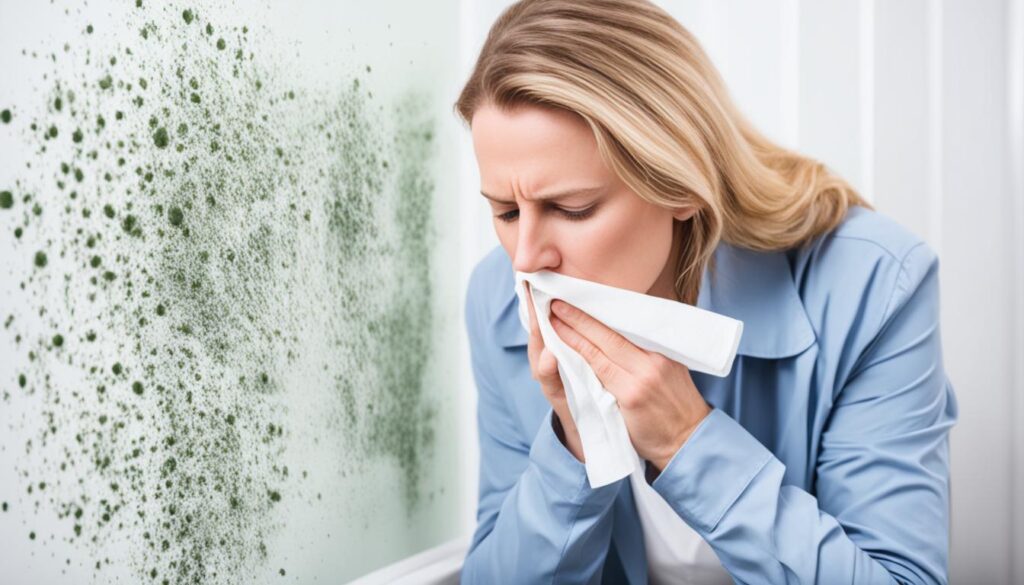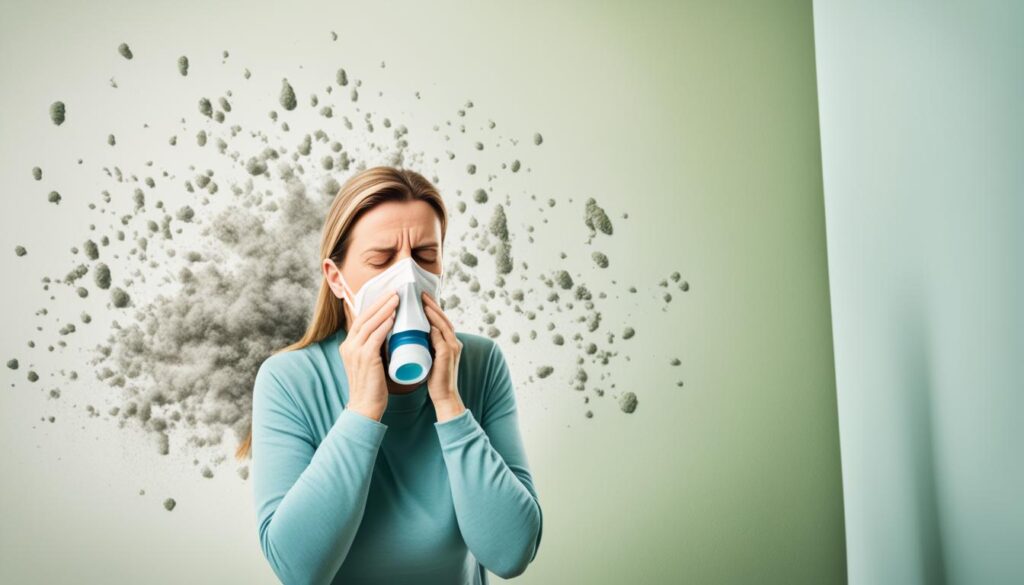
Florida Mold Poisoning Symptoms: Stay Safe
Living in Florida, it’s important to be aware of the potential risks associated with mold exposure. Mold can thrive in the humid climate of Florida and can pose a danger to your health if not addressed promptly. In this section, we will explore the symptoms of mold poisoning that can occur in Florida, allowing you to take the necessary steps to protect yourself and your loved ones.
Mold poisoning can have various symptoms, ranging from mild to severe. It’s crucial to recognize these symptoms early on to seek appropriate medical assistance and mitigate further exposure to mold. By staying informed, you can maintain a healthy living environment and safeguard your well-being.
Key Takeaways:
- Being aware of the symptoms of mold poisoning is crucial for Florida residents.
- Mold can thrive in Florida’s humid climate and pose health risks.
- Recognizing symptoms early allows for prompt medical attention and mold removal.
- Consulting professionals, such as Fix Mold Miami, can help with mold assessments and remediation services.
- Take action to protect your health and well-being when it comes to mold exposure and poisoning.
Understanding Mold Poisoning
In this section, we will delve deeper into the concept of mold poisoning. Mold poisoning, also known as mold toxicity, occurs when individuals are exposed to high levels of mold spores or mycotoxins, which are toxic substances produced by certain molds.
But how does mold poisoning occur? Mold thrives in damp and humid environments, such as basements, bathrooms, and areas affected by water damage. When these conditions are present, mold spores can easily spread and contaminate the air, leading to potential health issues for those exposed.
Exposure to mold spores or mycotoxins can result in a range of symptoms, which can vary from person to person. It is important to note that not everyone exposed to mold will experience mold poisoning symptoms. However, individuals with pre-existing respiratory conditions, weakened immune systems, or allergies may be more susceptible.
The potential health effects of mold poisoning can be diverse, affecting various bodily systems. Symptoms of mold poisoning can manifest as:
- Respiratory issues, such as coughing, wheezing, and shortness of breath
- Nasal congestion, sinusitis, and frequent sneezing
- Eye irritations, including redness, watery eyes, and itching
- Skin rashes, itchiness, and dermatitis
- Headaches, migraines, and difficulty concentrating
- Fatigue, weakness, and general malaise
- Joint pain, muscle aches, and stiffness
If you suspect mold poisoning, it is crucial to consult with a healthcare professional to evaluate your symptoms and determine the appropriate course of action. They may recommend testing your living environment for mold and conducting medical tests to assess potential mold-related health issues.
Understanding the nature of mold poisoning is key to identifying and addressing any symptoms you may experience. By staying informed and taking prompt action, you can protect your health and well-being.
Knowledge is the first step towards prevention and resolution. Take control of your health by learning about mold poisoning and staying vigilant about your living environment.

| Symptom | Description |
|---|---|
| Respiratory issues | Coughing, wheezing, shortness of breath |
| Nasal congestion | Sinusitis, frequent sneezing |
| Eye irritations | Redness, watery eyes, itching |
| Skin rashes | Itchiness, dermatitis |
| Headaches | Migraines, difficulty concentrating |
| Fatigue | Weakness, general malaise |
| Joint pain | Muscle aches, stiffness |
Common Symptoms of Mold Poisoning in Florida
It is crucial to be aware of the common symptoms of mold poisoning that individuals may experience in Florida. By recognizing these symptoms early on, you can seek appropriate medical help and take necessary steps to remove mold from your living environment.
Respiratory Issues: One of the most common symptoms of mold poisoning is respiratory problems. Exposure to mold spores can lead to coughing, wheezing, shortness of breath, and throat irritation.
Skin Irritations: Mold exposure can also cause skin irritations. Individuals may experience rashes, itchiness, or redness on their skin upon contact with mold or mold-infested items.
Allergies: Mold is a common allergen and can trigger allergic reactions in susceptible individuals. Symptoms may include sneezing, runny nose, itchy or watery eyes, and congestion.
Other Potential Health Problems: In addition to respiratory issues, skin irritations, and allergies, mold poisoning can also lead to other health problems. These may include headaches, fatigue, difficulty concentrating, memory problems, and even worsening of asthma symptoms, if the individual already has asthma.
Identifying Mold Poisoning Symptoms
It is important to note that these symptoms may vary from person to person, and the severity of symptoms can depend on several factors such as the individual’s sensitivity to mold, duration and intensity of exposure, and the type of mold present.
If you suspect mold poisoning, it is advisable to consult with a healthcare professional who can help determine the underlying cause of your symptoms and provide appropriate treatment.
Removing Mold from Your Living Environment
If you experience symptoms of mold poisoning and suspect mold growth in your home or workplace, taking immediate action to remove the mold is essential. Mold remediation should be done by professionals who can identify the source of the mold, perform thorough cleanup, and implement preventive measures to prevent future mold growth.
| Symptom | Description |
|---|---|
| Respiratory Issues | Coughing, wheezing, shortness of breath, throat irritation |
| Skin Irritations | Rashes, itchiness, redness |
| Allergies | Sneezing, runny nose, itchy or watery eyes, congestion |
| Other Potential Health Problems | Headaches, fatigue, difficulty concentrating, memory problems, worsening of asthma symptoms |

Conclusion
In conclusion, it is vital for Florida residents to be aware of the symptoms of mold poisoning. Recognizing these symptoms early on is crucial to safeguarding your health and taking appropriate actions. If you experience any of the common symptoms associated with mold poisoning, such as respiratory issues, skin irritations, or allergies, it is important to seek medical attention promptly.
Additionally, taking steps to prevent further exposure to mold is essential. Consulting with professionals, such as Fix Mold Miami, for mold assessments and remediation services is highly recommended. They can provide expert guidance and assistance in identifying and removing mold from your living environment.
Remember, your health and well-being should always be a top priority when it comes to mold exposure and poisoning. Stay informed, take action, and create a safe and healthy living environment for yourself and your loved ones.




